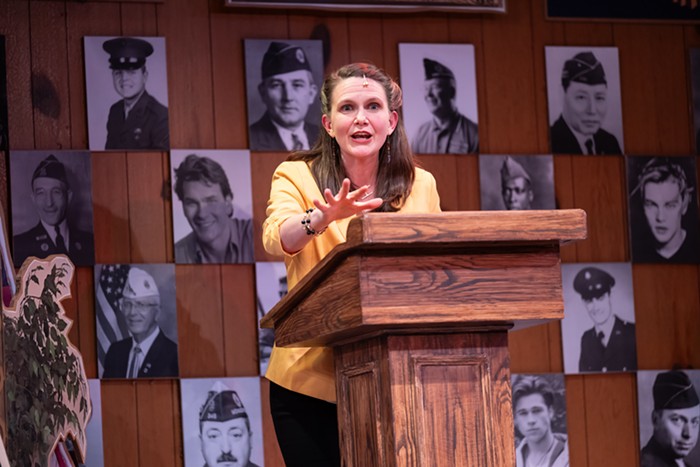WHEN CRITICS TALK about Will Eno's Middletown, they almost always compare it to Thornton Wilder's Our Town, which, on the face of it, seems reasonable. Both plays deal with characters navigating everyday life in small, New Englandish towns. But I would argue that the similarities stop there. Middletown, produced this month by Third Rail Repertory Theatre, is less soda-jerk narration about young love and the wonders of being alive, and more John Berryman truism: "Life, friends, is boring. We must not say so." This sentiment would be out of place in Grover's Corners, but it shoots through every interaction in Middletown, and coupled with the ever-present specter of death and decay, imbues the play with a sense of pure existential dread: Life, friends, is boring. But death is terrifying.
Middletown, it seems, is not a very nice place. Like the Springfields of North America, there are Middletowns in nearly every state, towns that seem to only exist in relation to the towns they are not. Eno's Middletown, we are told, is a place people go to and from, "crying in both directions." One of these people is Mary Swanson (Maureen Porter), a kind of every-yuppie who moves to Middletown with her absent husband, eventually making friends with John Dodge (Michael O'Connell), an underemployed, anxiety-prone handyman she meets at the library. Rounding out the story are a loveable, kooky librarian (Diane Kondrat); a police officer (Bruce Burkhartsmeier), who discusses the artifice of his authority even as he uses it to strangle the town drunk (Ben Newman), who wonderingly recalls being "a perfect baby"; a town astronaut (Damon Kupper); and a pair of over-sharers (Amy Newman and Darius Pierce), who, for inexplicable reasons, have chosen to vacation in Middletown.
Under the direction of Marcella Crowson, the ensemble cast does well with the play's numerous dual roles and smart, searching dialogue. Eno's writing is similar in its maximalism to Tom Stoppard's, and just as difficult to pull off. When it's done right, as it is here, it reads as charming and natural, not pretentious.
Curt Enderle's set design, too, is simple but clever. Above the action, a tiny Middletown, slightly bigger than an architectural model, sits before a blown-up town map. As the play moves through Middletown's various locations, the corresponding building lights up, like a list of stops in a subway car. It's way too subtle to be cutesy, and provides a necessary visual anchor in a meandering, dialogue-heavy play.
That's the good news. The bad news is that while this Middletown manages to be funny in a macabre way, and while it's propelled along by fantastic dialogue rather than hindered by it, Middletown the play—the source material—is crazily uneven, occasionally crossing the line between quietly intelligent and way too fucking clever. There's a whole "soooooo meta" bit right before intermission that finds the ensemble portraying a fake audience during a fake intermission, which, while mildly funny, doesn't seem to serve any greater purpose. The ending, too, deviates from Middletown's earlier, subtler material with a grand, much-too-literal juxtaposition of life and death that isn't nearly as interesting or convincing as anything that comes before it.
Granted, there's nothing wrong with meta-commentaries, or grand statements on the human condition. But stories of Life and Death often do better housed in small, ordinary moments, and these are the moments when Middletown is most alive and surprising. From the local librarian commenting on people who don't get library cards because "[they're] just going to die, anyway," to Mary's assertion that everything "seems so original when it happens to us," to the moment where a doctor carefully measures out anxiety pills against a hospital loading dock for the town drunk ("sometimes people spill things back here")—these anxious, almost boring everyday occurrences are Middletown's best, and Third Rail's production gets them right. If you're looking for Grover's Corners, you've come to the wrong place.



















